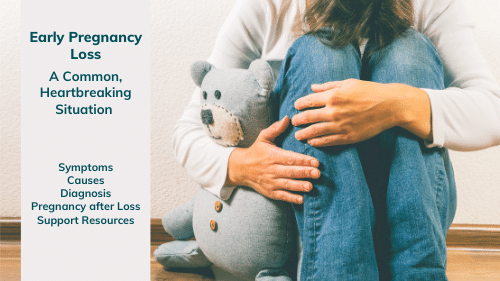Early Pregnancy Loss: A Common, Heartbreaking Situation
The loss of a pregnancy in the first trimester goes by many names: miscarriage, early pregnancy loss, non-viable pregnancy, as well as the medical term, spontaneous abortion. Early Pregnancy Loss is often the preferred term while caring for patients and their partners during this heartbreaking time. This term helps convey the weight of the actual loss. The term miscarriage (literally mis-carry or to carry incorrectly) seems to place some sort of unnecessary burden or fault on the patient which is completely undeserved. Spontaneous abortion and other versions of this term that are used in medical notes are descriptive only to medical professionals and insurance billing experts. So, for the purposes of this article, the topic will be referred to as early pregnancy loss. Other types of non-viable early pregnancies, such as ectopic pregnancy, will not be covered here. Recurrent pregnancy loss, the loss of at least two or more consecutive pregnancies, is outside of the scope of this article as well.
Early pregnancy loss is a very common occurrence. Early pregnancy loss occurs in up to 10-20% of clinically recognized pregnancies. For an individual, the exact risk of pregnancy loss in the first trimester will depend on many factors such as how early a patient is testing for pregnancy, a patient’s age, and a patient’s history of previous pregnancy loss.

Symptoms of Early Pregnancy Loss
Early pregnancy loss can sometimes have symptoms such as cramping, spotting, bleeding, and passage of the pregnancy tissue. The amount of pain and bleeding depends on how advanced a pregnancy is when it stops developing. Pregnancies closer to the end of the first trimester near 11-12 weeks can have significant bleeding and pain associated with their loss if it happens spontaneously.
It’s very important to note that not all cramping, spotting, or bleeding in the first trimester leads to pregnancy loss. Many times, the pregnancy continues. In these situations, the source of bleeding is most likely from the edge of the placenta. This is called a subchorionic hemorrhage. If you are pregnant and experiencing any of the above symptoms, please call your obstetric provider. An ultrasound and an exam are the best way to evaluate you and your pregnancy.
Early pregnancy loss can also be asymptomatic or having no symptoms. You may not know anything is wrong with the pregnancy until you go to the office for a routine visit or ultrasound and find out that there is no longer a heartbeat and the baby stopped developing. This particular medical diagnosis is called a missed abortion. The pregnancy has stopped developing but the pregnancy loss process has not yet started.
Diagnosis of Early Pregnancy Loss
The diagnosis of an early pregnancy loss, or a non-viable pregnancy, is based on a combination of factors that include:
- date of a patient’s last menstrual period
- findings of previous and current ultrasounds
- amount of time that has passed between those ultrasounds
- symptoms such as bleeding and cramping
- findings on physical exam
- lab test results
Not all factors must be utilized to make the diagnosis in each case. It’s important to note that it is not always possible to give a patient a definitive diagnosis at the time of the first evaluation. It can be necessary to wait several days for repeat blood work or 7-10 days before repeating an ultrasound to be certain of the diagnosis.
Causes of Early Pregnancy Loss
The most common cause of early pregnancy loss is a genetic problem such as an abnormal number of chromosomes. This situation becomes more common as patients get older and is the reason that pregnancy loss also increases with age. Genetic problems account for about half of losses. Uncontrolled diabetes, obesity, substance abuse, untreated thyroid disease, and infections such as syphilis, CMV, Zika virus and parvovirus can all increase the risk of pregnancy loss. Many pregnancy losses are also unexplained. Early in embryonic and fetal development, tens of thousands of steps and processes must occur in exactly the right order and at the right time. If a key process does not happen correctly, the pregnancy stops developing.
You Did Nothing Wrong
Many patients diagnosed with an early pregnancy loss often immediately try to think about how the outcome could have been different. “Did I do something wrong?” is one of the most common questions. You did not do anything wrong. Let me repeat that. You did not do anything wrong. It was not the glass of wine you drank before knowing you were pregnant, it was not going for a long run, it was not all the job stress you have been under, it was not getting your COVID vaccine, etc. The pregnancy loss could not have been prevented by bed rest, vitamins, or going to the doctor sooner. Similarly, there is nothing your healthcare provider could have done to have changed this outcome. You could not have changed this.
Treatment Options for Early Pregnancy Loss
There are multiple management strategies for patients experiencing a first trimester pregnancy loss. If the process has started spontaneously, the bleeding is not excessive and all of the pregnancy tissue passes completely on its own, no medical intervention is necessary.
If a patient is having excessively heavy bleeding, defined as soaking one pad or more per hour for 2 consecutive hours, they should be evaluated immediately. In this situation, a patient may require an urgent minor surgical procedure in the office, or the hospital called a D&C (Dilation and Curettage) to remove the pregnancy tissue from the uterus and stop the bleeding.
For a patient with an asymptomatic early pregnancy loss, there are multiple treatment options. The first option is expectant management. This is also called the “watch and wait” method. Eventually, the uterus of most patients will begin to cramp and bleed, and the pregnancy tissue will pass. The timing is difficult to predict, and this uncertainty can be difficult for many patients. The amount of pain and bleeding will depend on how advanced the pregnancy was when it stopped developing. Your MCWHC provider can help give you a reasonable estimation about how much bleeding or pain to expect depending on your stage of pregnancy. Following the initial episode of heavier bleeding and passage of pregnancy tissue, the bleeding then slows and transitions into something more like a heavier than average period for most patients. This management option is not typically offered later in the first trimester because of the higher chance of heavy bleeding and need for urgent surgery.
The second treatment option is medical management, triggering the pregnancy loss process with medication, instead of waiting for the uterus to begin cramping and bleeding on its own. The onset of cramping and bleeding happens within a few hours after taking the medication. The amount and duration of bleeding is similar to the bleeding described above for expectant management. The benefit of using the medication to induce the process is improved control over the timing and the ability to avoid a surgical procedure. A potential downside is that the onset of bleeding and cramping can be more abrupt. Medical management is effective about 80% of the time. An ultrasound must be performed 1-2 weeks later to ensure complete emptying of the uterus. It is important to note that with both expectant and medical management, heavy bleeding and incomplete passage of the pregnancy tissue can sometimes occur. If you are soaking a pad an hour for 2 consecutive hours, or have severe cramping pain, you should call your MCWHC provider for immediate evaluation.
The third treatment option is a minor surgical procedure called a D&C or Dilation & Curettage. This minor surgical procedure is performed as an outpatient under twilight sedation. It can be performed in the hospital, surgery center, or office setting. Even though the sedation is called “twilight,” from a patient perspective, you are asleep and do not feel or remember anything. During the procedure, the cervix is dilated, and the pregnancy tissue is removed from the uterus with a suction device. The procedure takes approximately 10-15 minutes. There is a very low risk of complications such as infection, bleeding, or damage to the uterus or surrounding organs. You can go home after the procedure. Light bleeding and mild cramping may continue for up to a week following the procedure.
Menstrual Cycle Post Pregnancy Loss
The normal menstrual cycle typically returns within 4-8 weeks after an early pregnancy loss. For patients who wish to immediately try to conceive again, you may do so as soon as your period returns. If you do not wish to pursue pregnancy again right away, contraception may be started immediately after the pregnancy loss. If you desire immediate contraception, please discuss this with your provider as soon as possible. This is important to help reduce the risk of an unplanned pregnancy before you are ready to conceive again. If you desire an option such as an IUD and are undergoing a D&C, it can be placed at the time of the procedure in many cases.
Grieving After Pregnancy Loss
While it is medically straightforward in most cases, early pregnancy loss can be an emotional rollercoaster. From the moment that the positive sign appears on the pregnancy test, parents begin to dream and imagine what their pregnancy and child will be like. Then, suddenly, these dreams are taken away. Grieving is normal and healthy and there is no right or wrong way to feel. Inevitably, someone who is trying to be helpful, supportive, and reassuring will say something that hits you the wrong way. Classic examples of this are “you can try again,” “you were so early, at least you were not farther along,” or “you’ll have more.” These are just a few examples of comments that may make you clench your teeth, cry, or scream that they just do not understand. Talk to your partner, an understanding friend, or religious advisor. If you feel like your grief is profound and unending or you are having difficulty getting through your day, talk to your doctor. In addition to working with a therapist individually, there are many available resources to help support patients and families who have experienced pregnancy loss. Please see the end of this article for a brief list of available resources throughout the northwest suburbs. Included in this list are additional resources for partners. We understand that they are grieving during this process also.
Getting Pregnant After Pregnancy Loss
What about next time, should you decide to try again? Statistics are in your favor. Going through one first trimester pregnancy loss does not increase your risk of having it happen again. Most patients have a completely uncomplicated pregnancy the next time they get pregnant. Most patients who have experienced an early pregnancy loss have increased anxiety during their next pregnancy, especially during the first trimester. It can be helpful for patients to have visits slightly more frequently to be able to hear the baby’s heartbeat and to be reassured that all is progressing well with the next pregnancy. If you feel like this would be helpful for you, please talk to your physician so that MCWHC can help support you during this time.
Patient and Partner Support Resources
NorthShore Perinatal Family Support Services
24-hour Support Line: Call 866-364-6667
Full range of emergency and referral services for all aspects of emotional support surrounding infertility, pregnancy, loss, and postpartum depression. If you get voicemail, leave a message and they will call you back soon.
https://www.northshore.org/pediatrics/specialty-programs/neonatology/perinatal-family-support-center/perinatal-loss/
AMITA Health Northwest Perinatal Loss Support Group
Call 847-618-8415
Monthly Support Meetings. Spouses/Partners/Support persons welcome.
https://www.amitahealth.org/find-a-service/hospice-care/patient-resources/grief-support-groups-and-bereavement-services
Star Legacy Foundation
Support Line: Call 952-715-7731
Speak with a Grief Counselor who has personal experience with pregnancy and infant loss. If you get voicemail, leave a message and they will call you back within 24 hours. Online support group for families who have experienced a perinatal loss and for individuals experiencing a pregnancy after a loss.
https://starlegacyfoundation.org/family-support/
Share Pregnancy and Infant Loss Support Group
Group meets the 1st Thursday of every month at 7:00 pm at Feinberg Pavilion at Northwestern Memorial Hospital, 251 E Huron (Academy Room 2-716), Chicago, IL 60611. To register, contact srizzato@nm.org.
https://nationalshare.org/illinois/#
For Male Partners
BBC News How Miscarriage affects Men
https://www.youtube.com/watch?v=lkXlOjFJN1g
Male Partner Support Podcast – Dad Still Standing
https://dadstillstanding.libsyn.com/
For Patients who are faced with making the difficult decision of ending a desired pregnancy for medical reasons:
https://endingawantedpregnancy.com/
The Postpartum Depression Alliance of Illinois
Call 847-205-4455 and leave a message. They return calls within 24 hours.
Offers non-emergency email and phone support to women across the state of Illinois who are suffering from postpartum depression. The support volunteers are all moms who have experienced either a pregnancy or postpartum mood disorder themselves.
https://www.ppdil.org/
March of Dimes – Ways to Honor Your Loss
https://www.marchofdimes.org/complications/loss-and-grief.aspx
American College of Obstetricians and Gynecologists – Pregnancy Loss Information
https://www.acog.org/womens-health/faqs/early-pregnancy-loss
About The Author
MIRIAH PLAWER, M.D., F.A.C.O.G.
Miriah Plawer, M.D., F.A.C.O.G. is a Board Certified OB-GYN since 2008 and a Fellow of the American College of Obstetricians and Gynecologists. She is affiliated with hospitals of the NorthShore University Health System (primarily Evanston Hospital). Dr. Plawer graduated from the University of Illinois College of Medicine with honors and completed her OB-GYN residency program at Northwestern University.
Dr. Plawer is certified in the insertion and removal of LARCs (Long Acting Reversible Contraception). She is also fluent in medical Spanish.
In her spare time, Dr. Plawer enjoys spending time with her family, cooking, reading, traveling, and watching little league baseball. She is currently accepting new patients by calling 847-869-3300.





